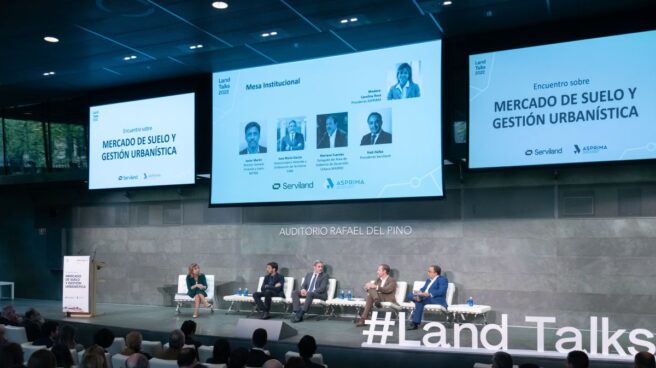

Photo of the Land Talks event organized by Serviland and Asprima
the importance of providing a legal framework for security in order to overcome problems such as lack of land and housing Satisfying social demand was one of the most important aspects during the first edition of Land Talks, a conference organized by Serviland and Asprima to highlight the current situation and challenges that the land market and urban management must face.
Various agents, both from the private and public sectors, also agreed on the importance of public-private cooperation, where interests must be aligned, regardless of election cycles, in order to develop a structure equipped with the necessary tools. land supply and the adaptation of urban development to current circumstances and rhythms.
The conference, which was attended by over 200 people, included presentations from, among others, representatives from the three levels of government in Madrid who offered a global perspective on how the public approaches land management and what initiatives they are promoting. developing.
In this sense, Javier Martin, CEO of Housing and Land of Mitma, highlighted the improvements that are planned to be made in the new Land Law to avoid block planning cancellation due to formal defects, and highlighted the progress they are making. mobilize the lands of the finalists and release the dammed lands in the hands of the administration.
The table was also addressed by the Deputy Minister of Housing and Spatial Planning of the Community of Madrid, José María Garcia, who referred to the “Consolidated Law”, which is supposed to give the keys to the land production process for this. fluid in time and be able to operate under legal certainty, which becomes the “nuclear element”. As progress has been made, there is consensus that the law should be approved in mid-December at the next parliamentary assembly.
from the City Council of Madrid, the delegate of the Urban Development Zone, Mariano Fuentes, announced that “the file is already being processed on Amending City Rules to Bring It to Prior Approval,” and the municipal plenary is expected to give its approval in January. As he explained, the new planning rules are intended to provide more legal certainty in the sector, as well as to ensure regulatory clarity, simplify procedures and update its definitions.
A look at the private environment was presented by Iheb Nafaa, president of Serviland, who insisted on “the need for more flexibility” both to give way to projects that are on the municipality’s table and to be able to attract investment in the sector.
In this regard, Nafaa reiterated the importance of having a stable and clear legal framework to avoid the current uncertainty, while promoting formulas to encourage private investment.
At the opening of the conference, Carolina Roca, president of Asprima, noted that “developers are committed to bringing to market all the energy efficient and sustainable housing that demand requires, but for this it is essential to end the shortage of our raw materials, which is soil. To do this, we need the full cooperation of the administration both in the regulatory framework and in management.”
A small amount of land
Land Talks brought together Alberto Valls, partner in charge of Deloitte Real Estate, and Felipe Iglesias, urban planning expert from Uria Menéndez, to analyze market prospects and offer a legal diagnosis of land in Spain.
Deloitte partner said that demand for land remains strong, stable and concentrated in first and second tier cities, while urban planning consultant Felipe Iglesias drew attention to a gap in existing legal regulations and confirmed greater regulatory homogeneity and move towards more strategic general planning models with established development criteria, but not deterministic.
The event was also attended by Miguel Hernandez, director of strategy at CreaMNN; Domingo Menendez, manager of the Valdecarros Compensation Board; Leonardo Sánchez-Heredero, President of Grupo Delta, and Carmen Largacha, Senior Architect and Urban Planner at ARUP, at a table discussing the leverage needed to advance major urban transformation and adaptation projects.
Sustainability It was the last block of the first issue of Land Talks. A sustainable city, yet accessible to citizens and maintaining a balance between environmental, social and economic sustainability, are some of the main findings of the table brought together by Raimundo Erraiz, CEO of Madrid’s urban community; Jordi Soldevila, CEO of BuildingCenter CaixaBank; Sigfrido Erráez, Dean of the Official College of Architects of Madrid (COAM); Juan Antonio Gómez Pintado, CEO of Vía Ágora, and Vicente Llacer, CEO of Grupo Ática.
Source: El Independiente